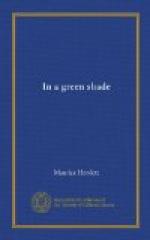A book which I shall never willingly be without, one of my minor classics, is Idlehurst. Published in 1898, its author John Halsham, it has a touch upon country things, the penetrating, pitiful and tant soit peu condescending touch upon them of one who is both scholar and recluse, fastidious but discerning. He reads our earth, cloudscape, landscape, season, foison, man and beast of the field, with the same wistfulness which women who have known sorrow exhibit for children who have not. Reading him again, however, last night, after the long interval of fever and unrest which the war has enforced, I found his pessimism troublesome. Sussex, so far as I know it, is not so degenerate as he seems to have found it; and surely since the war began he must have changed his mind. It is hard to remember 1898, or 1913 for that matter, but I happen to know that Sussex emptied itself of its young manhood, and voluntarily, because I went to live there for a while in 1915 and found the village of my choice bare of youth. But that was West Sussex, and John Halsham lives nearer London, in the forest region, as I judge, which is a part of the country overflowed and become suburban. I don’t doubt but complete cockneyfication will be the ultimate fate of that country of deep loam and handsome women before many years are over. Going down to my village from London, I could not feel that I was in the country until I had passed Pulborough; and further east the same would hold good to Lewes.
But when Mr Halsham in his bitterness cries out that “the town has overflowed the country,” meaning the whole country, and that “we are cockney from sea to sea,” he is being tragic at the cost of truth. Would he drag Wiltshire and all the pastoral West into his turmoil? You may go about any of the villages here, watch the daily doings of the inhabitants, and feel confident that, practically, there has been no substantial change since the Norman Conquest. The “feeling” of the scene is the same as it always was, the outlook of the people, their habit of mind, is the same. The one apparent difference is in religion, and that is not a difference of substance but of accident. We have forgotten the Madonna and the Saints, who were taken away from us by violence. We still go to church, but they are not there any more. They were expelled with a fork: one Cromwell but completed what another began. And now it is late in the day: they can never be brought back. “Vestigia nulla” is true of religion as of every other human affair. But it was not them we worshipped. Rather it was what they stood for—which endures.




